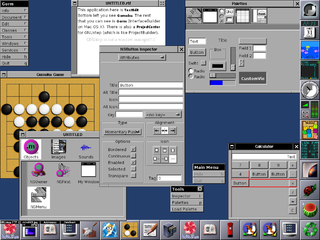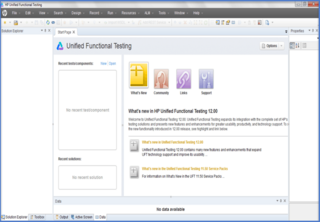
LaTeX, stylized within the system as LaTeX, is a software system for document preparation. When writing, the writer uses plain text as opposed to the formatted text found in "What You See Is What You Get" word processors like Microsoft Word, LibreOffice Writer and Apple Pages. The writer uses markup tagging conventions to define the general structure of a document, to stylise text throughout a document, and to add citations and cross-references. A TeX distribution such as TeX Live or MikTeX is used to produce an output file suitable for printing or digital distribution.
The Portable Document Format (PDF) is a file format developed by Adobe in the 1990s to present documents, including text formatting and images, in a manner independent of application software, hardware, and operating systems. Based on the PostScript language, each PDF file encapsulates a complete description of a fixed-layout flat document, including the text, fonts, vector graphics, raster images and other information needed to display it. PDF was standardized as ISO 32000 in 2008, and no longer requires any royalties for its implementation.
Cocoa is Apple's native object-oriented application programming interface (API) for its desktop operating system macOS.

GNUstep is a free software implementation of the Cocoa Objective-C frameworks, widget toolkit, and application development tools for Unix-like operating systems and Microsoft Windows. It is part of the GNU Project.
Cross Platform Component Object Model (XPCOM) is a cross-platform component model from Mozilla. It is similar to Microsoft Component Object Model (COM) and Common Object Request Broker Architecture (CORBA). It features multiple language bindings and interface description language (IDL) descriptions; thus programmers can plug their custom functions into the framework and connect it with other components.

Plone is a free and open source content management system built on top of the Zope application server. Plone is positioned as an "Enterprise CMS" and is commonly used for intranets and as part of the web presence of large organizations. High-profile public sector users include the U.S. Federal Bureau of Investigation, Brazilian Government, United Nations, City of Bern (Switzerland), New South Wales Government (Australia), and European Environment Agency. Plone's proponents cite its security track record and its accessibility as reasons to choose Plone.

MediaWiki is a free and open-source wiki engine. It was developed for use on Wikipedia in 2002, and given the name "MediaWiki" in 2003. It remains in use on Wikipedia and almost all other Wikimedia websites, including Wiktionary, Wikimedia Commons and Wikidata; these sites continue to define a large part of the requirement set for MediaWiki. MediaWiki was originally developed by Magnus Manske and improved by Lee Daniel Crocker. Its development has since then been coordinated by the Wikimedia Foundation.
Rational ClearCase is a family of computer software tools that supports software configuration management (SCM) of source code and other software development assets. It also supports design-data management of electronic design artifacts, thus enabling hardware and software co-development. ClearCase includes revision control and forms the basis for configuration management at large and medium-sized businesses, accommodating projects with hundreds or thousands of developers. It is developed by IBM.
XWiki is a free wiki software platform written in Java with a design emphasis on extensibility. XWiki is an enterprise wiki. It includes WYSIWYG editing, OpenDocument based document import/export, semantic annotations and tagging, and advanced permissions management.

ArcGIS is a geographic information system (GIS) for working with maps and geographic information maintained by the Environmental Systems Research Institute (Esri). It is used for creating and using maps, compiling geographic data, analyzing mapped information, sharing and discovering geographic information, using maps and geographic information in a range of applications, and managing geographic information in a database.

JabRef is an open-sourced, cross-platform citation and reference management software. It uses BibTeX and BibLaTeX as its native formats and is therefore typically used for LaTeX. The name JabRef stands for Java, Alver, Batada, Reference. The original version was released on November 29, 2003.

Zotero is a free and open-source reference management software to manage bibliographic data and related research materials. Notable features include web browser integration, online syncing, generation of in-text citations, footnotes, and bibliographies, as well as integration with the word processors Microsoft Word, LibreOffice Writer, and Google Docs. It is produced by the Center for History and New Media at George Mason University.

Silverstripe CMS is a free and open source Content Management System (CMS) and Framework for creating and maintaining websites and web applications. It provides an out of the box web-based administration panel that enables users to make modifications to parts of the website, which includes a WYSIWYG website editor. The core of the software is Silverstripe Framework, a PHP Web application framework.
The following tables compare notable reference management software. The comparison includes older applications that may no longer be supported, as well as actively-maintained software.

BibDesk is an open-source reference management software package for macOS, used to manage bibliographies and references when writing essays and articles. It can also be used to organize and maintain a library of documents in PDF format and other formats. It is primarily a BibTeX front-end for use with LaTeX, but also offers external bibliographic database connectivity for importing, a variety of means for exporting, and capability for linking to local documents and automatically filing local documents. It takes advantage of many macOS features such as AppleScript and Spotlight.

RefDB is a client/server reference database and bibliography tool for markup languages like SGML, XML, and LaTeX. It is suitable for standalone use for the purpose of self-archiving, but can be used as an institutional repository as well. Data storage proper is done in one of several supported SQL database engines. RefDB runs on Unix-like operating systems and on Windows/Cygwin. RefDB is licensed under the GPL.

Micro Focus Unified Functional Testing (UFT), formerly known as QuickTest Professional (QTP), is software that provides functional and regression test automation for software applications and environments.
Wikindx is a free bibliographic and quotations/notes management and article authoring system designed either for single use or multi-user collaborative use across the internet. Wikindx falls within the category of reference management software, but also provides functionality to write notes and entire papers. Developed under the GNU GPL license, the project homepage can be found at sourceforge.net and the required files/updates are available for download there.
OpenWrt is an open source project for embedded operating systems based on Linux, primarily used on embedded devices to route network traffic. The main components are Linux, util-linux, musl, and BusyBox. All components have been optimized to be small enough to fit into the limited storage and memory available in home routers.

colwiz is a free web, desktop and mobile based research management software, designed by researchers from the University of Oxford. colwiz incorporates reference management, collaboration and networking tools, as well as productivity features.












